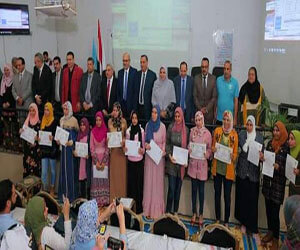The Minister of Higher Education reviews a report on the achievements of universities in eradicating illiteracy
Dr. Khaled Abdel Ghaffar, Minister of Higher Education and Scientific Research, received a report submitted by Dr. Muhammad Latif, Secretary of the Supreme Council of Universities, on the efforts of universities to confront the problem of illiteracy, within the framework of the national project to eradicate illiteracy in Egypt, in cooperation with the General Authority for Literacy and Adult Education.
The minister stressed the importance of exploiting the capabilities of Egyptian universities, and benefiting from their capabilities in eradicating illiteracy and adult education, pointing to the need to follow up on the implementation of the state’s plan to declare “Egypt without illiteracy” to achieve the goals of the sustainable development plan (Egypt Vision 2030).
Abdel Ghaffar added that Egyptian universities have great human and material capabilities, which can be used in facing this serious problem. He praised the success of Egyptian universities in eradicating illiteracy (310,286) citizens during the period from October 2019 to this April; Especially in light of the challenges posed by the Corona pandemic.
The Minister indicated that these achievements were achieved thanks to a number of measures, including: the implementation of a cooperation protocol between the Supreme Council of Universities and the General Authority for Literacy and Adult Education, the formation of a specialized committee to formulate a comprehensive plan to confront illiteracy, the Ministry's participation in the implementation of the illiteracy challenge project at the level of the Arab world, and the launch of Several competitions at the level of universities and institutes; To compete for the best university award in facing the problem of illiteracy.
Abdul Ghaffar also thanked the Supreme Committee for following up on the implementation of the literacy project in universities at the Supreme Council of Universities, headed by Dr. El-Hilali El-Sherbiny, a professor at Mansoura University and Minister of Education and Technical Education, preceded the efforts of the distinguished committee in confronting the phenomenon of illiteracy.
The minister also called for the universities to cooperate with the General Authority for Literacy and Adult Education within the framework of the presidential initiative “a decent life” to eradicate the illiteracy of citizens in rural Egyptian villages, noting that the necessary support will be provided that universities need; To enable it to play its national role in facing this challenge, stressing that the literacy problem will be of great importance and will come at the top of university work priorities during the coming period, within the framework of the social and national responsibility of universities.
The report pointed out the success of Egyptian universities in providing luminous models and achieving great achievements in facing the problem of illiteracy, including the success of Ain Shams University in eradicating illiteracy (34,973) citizens, followed by Minya University (34,658), then Mansoura University (34905), Zagazig (30437) and Tanta (27572). South Valley (21429) Assiut (17707) Sohag (14572) Beni Suef (14013) Menoufia (10181) Al-Azhar (10426) Damietta (8659) Kafr El-Sheikh (6734) Helwan (7316) Damanhour (7865) Aswan (6595) Alexandria 3828) New Valley (3641) Suez (2177) Sadat City (2494) Suez Canal (1305) Port Said (1120).
Some other universities have also achieved distinguished results and very rich experiences, including the universities (Cairo, Arish, Matrouh, Benha, Luxor, and 6th of October).
On his part, Dr. Adel Abdel Ghaffar, Media Adviser and Spokesperson for the Ministry of Higher Education and Scientific Research, said that the universities’ serious role in the field of illiteracy eradication reflects their vital and effective role in community service and environmental development, pointing to the universities’ keenness to support Egypt’s Vision 2030 and contribute to the implementation of the human-building strategy launched by the leadership. political, through the implementation of an integrated plan to support the national project to eradicate illiteracy and adult education; Emphasizing the role of universities in spreading science, knowledge, enlightenment, and combating illiteracy; And to activate its pioneering role in serving the Egyptian society.



.svg)




